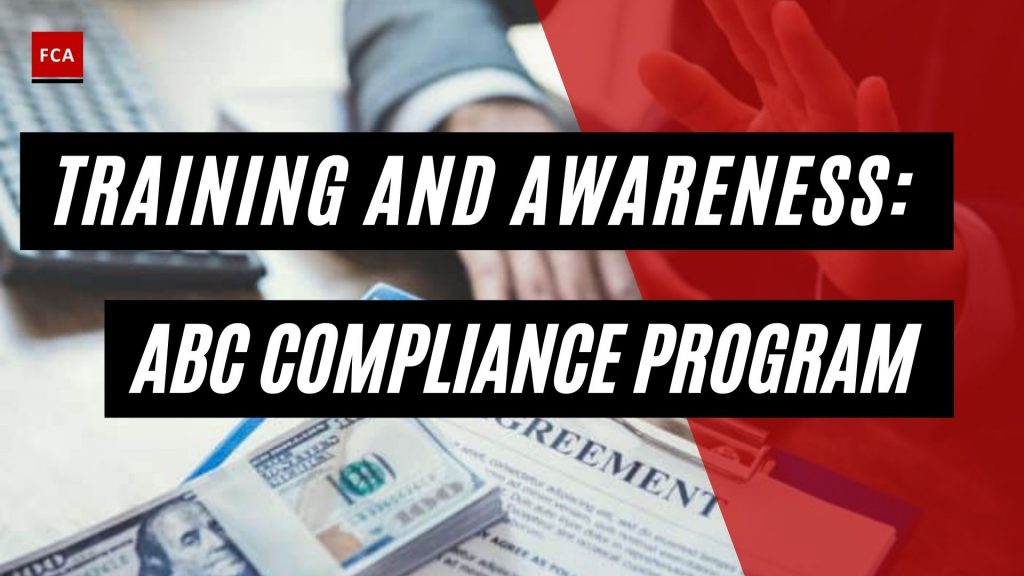Training and awareness. Communication of the anti-bribery and corruption compliance program through policies, procedures, and guidance, must be ensured with the appropriate and tailored risk-based training for the employees and certain third-party providers. Training provides an opportunity for the employees and the stakeholders to understand the employer’s requirements and the regulators.

Training And Awareness: ABC Compliance Program Elements #5
The organization’s Compliance Officer must ensure that these training programs are developed and training sessions are provided to the employees at frequent intervals, considering the changes in the regulatory requirements in the overall anti-bribery and corruption frameworks.
ABC policies, standards, and procedures should be effectively communicated, have as their foundation a ‘tone from the top’ message from Senior Management, and apply to persons at all levels of the organization. Specific bribery and corruption training should also be provided to Senior Management, members of the Board, and appropriate employees upon joining the organization, and after that, periodically, with the frequency informed by the corruption risk posed by their roles.
Training and communications should also be provided to third parties identified as presenting heightened levels of risk to the organization (e.g., high-risk intermediaries). Substantively, training should include relevant definitions, references to applicable internal policies, procedures, and laws and regulations, along with case studies, practical examples, and lessons learned, which present potential scenarios that employees may encounter.
The training should include information on when and how to seek advice and report any concerns or suspicions of corruption. Post-training assessments or attestations of understanding should be completed by trainees with training completion records maintained. Effective retention of such training records facilitates tracking and reporting.

Training Sessions
Training sessions must be provided by the subject matter expert, who may be the ABC officer of the organization. Organizations may also arrange training of external technical consultants, who possess the required subject matter expertise and current knowledge about the anti-bribery and corruption applicable legal and regulatory requirements.
Training needs of the employees are required to be assessed by the senior management by assessing the awareness and knowledge of the employees regarding the regulatory requirements that deal with bribery and corruption activities.
Considering the training needs of the employees, the human resource function, in collaboration with the ABC officer, must design and arrange the training sessions periodically for all the employees. The training sessions should be provided to the existing and new employees to show them how to minimize the risks of bribery and corruption. The training sessions must include the element of punishment, which may be given to those employees who are found involved in the illegal activities.

Training Requirements
Training requirements must cover all the regulators’ applicable legal and regulatory requirements to avoid and control bribery and corruption activities. Senior management must ensure that all training sessions are recorded to have a track record of those provided with the training sessions. Considering the training record, it must be ensured that all those employees, including the new joiners, are lined up for the anti-bribery and corruption training sessions.
The bribery and corruption risks linked with gifts and hospitality, hiring or internships, charitable donations, political contributions, and the changes in the business activities that may materially increase the exposure to bribery and corruption risks should be considered part of the training. The transactions, products, or services, including those that involve state-owned organizations or Public Officials, and the activities of the branches and subsidiaries must also be included in the training sessions. The organization must take measures to adjust and update its compliance program.
Such adjustments should also be highlighted in training to ensure that all current requirements are provided to the employees through training classes by the subject matter experts, including the compliance officer.
Final Thoughts
An organization’s success is inextricably linked to the confidence and trust placed in it by its employees, customers, regulators, stockholders, and business partners, as well as its overall reputation. As a result, the need for a comprehensive ABC framework is critical because it demonstrates the institution’s commitment to ethical behavior as well as its recognition of its role in protecting the financial system from financial crime, including bribery and corruption.








